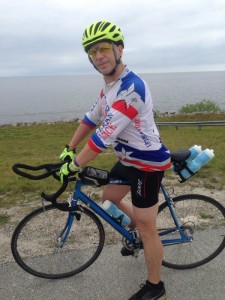Cycling and Autism
Nearly a quarter century ago, the Autism Society launched a nationwide effort to promote autism awareness, inclusion and self-determination for all, and assure that each person with ASD is provided the opportunity to achieve the highest possible quality of life. To honor April – National Autism Awareness Month, we welcome back guest blogger Patrick “Paddy” McCallister, St. Lucie Transportation Planning Organization Bicycle/Pedestrian Advisory Committee member, to tell his story:
“You have Asperger syndrome. Very rare.” It was 1993 and the psychiatrist proclaimed the words that would become a hallmark of my life, although I ignored and denied them for 20 years. April is celebrated as Autism Awareness Month by many organizations that deal with Autism Spectrum Disorder, which includes Asperger syndrome.
Cycling and autism go hand-in-hand for me. We autistics love rotation, spinning. We love rhythmic activities and can do them for hours. We dislike facial contact. When I’m cycling, I’m in an autistic’s dream world. The front wheel’s spin is absorbing, soothing. I’m moving in a repetitious motion for hours releasing a lot of built up sensory stress.
My cycling buddies — well on saddles they’re not wanting facial contact. All eyes forward; watch the road even when you’re chatting. The autistic obsession I have with talking about narrow interests at length — among cyclists it’s invisible. They’re talking about nothing but bikes and cycling, too. When I’m among fellow cyclists, everyone is acting like me for a couple hours and I’m not the weird one.
I’ve given up driving, which wasn’t hard. I always disliked driving, because of low sensory thresholds. As I got older and less able to handle sensory stress, the more concerned I got about being able to drive safely. I got a small fleet of bicycles to commute, shop, work, play and exercise on. Bicycles give me a way to get around without endangering others.

Patrick McCallister, Port St. Lucie, is a high-functioning autistic who finds one of his rare places to fit in with people among fellow cyclists. April is Autism Awareness Month. McCallister says that anyone who’s done group rides for awhile knows one or more autistics. Cycling is a recreation and sport that fits the needs and preferences of those with autism spectrum disorder. He’s pictured by Lake Okeechobee during the recent Riding for Heroes hosted by the Treasure Coast Cycling Association and Justin’s Wings. Photo by Richard Ramos.
Cycling is an attractive recreation and sport for autistics all along the spectrum, from non-verbal to high-functioning. The generally accepted population of autistics is about one in 70 people. Chances are if you ride in groups long enough, you’re cycling with some people on the autism spectrum. It’s Autism Awareness Month, so be aware of that you’re probably part of a cycling autistic’s favorite social circle.
Do you have a bicycle story to tell? Photos to share? Be our guest and be our next guest blogger! Send your story and photos to Becky@floridabicycle.net. Speaking of stories, our quarterly Messenger newsletter is available online for your internet reading pleasure. Visit the FBA website Home page or click here. Want a hard copy of our Messenger? Join Florida Bicycle Association or visit one of our bicycle shop members!
Rejjee, Inc., the smart way to manage all of your valuables, has been selected by the Florida Bicycle Association to be their official bicycle registry to help reduce bike theft and increase recovery of stolen bikes. Register your ride for FREE at SAFE Bikes – use code FLBikes and Rejjee will donate $3 to Florida Bicycle Association!
Complete Streets Savvy, or CSS, is a general, non-confrontational bicycle educational presentation. The purpose is to provide basic information with regards to the Florida Department of Transportation’s adoption of Complete Streets policy and how cyclists and motorists can share the road safely. This presentation runs 10 – 15 minutes and is designed for legislators, civic organizations and other entities that meet regularly and need informative content. There is no fee. Make your request for CSS today!




I am also HFA and into cycling. I always found it difficult to fit in anywhere until I started cycling. You explained in this article something that I have tried to express many times without success.
I find that in cycling groups I am always welcome. Many a time I have warned people in a group I am new to that I might not understand tone because of being on the spectrum and there has never been a time that I didnt receive the responses “I know another guy like that,no worries” or “that sounds like” followed by the name of a fellow rider.
Do you find your obsession changes within cycling to different disciplines every few months letting you experience most forms of cycling?
I have asperger’s, too and would like to know what kind of ear protection will fit under my helmet. Motorcycles when they rev their engines tend to irritate me; I am only looking to ride a bike. In the state i want to live in, we are required to have our bikes equipped with a bell that can be heard up to 100 ft ahead of us. This I know will irritate me and I am looking for a way to protect myself from being irritated by the sound. I am highly sensitive to sound.
My teenage son, who also has autism, can relate to everything described in this article. His love for spinning wheels and repetitive movements is what drove him to start his own bicycle repair business. We have also found that the cycling community is very embracing and inclusive, which has been of great comfort for us. Bicycles have changed my son’s future, where otherwise he may not have had a promising one. Thank you all!
My dilemma is with the desire to flee! As you know kids with Autism are escape artists . He can ride a bike but takes off!